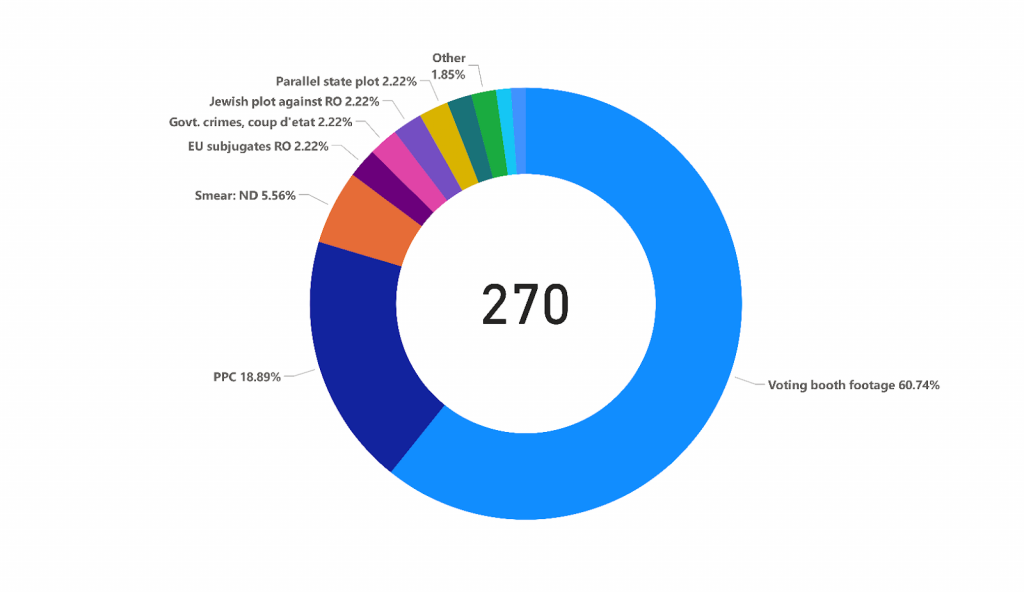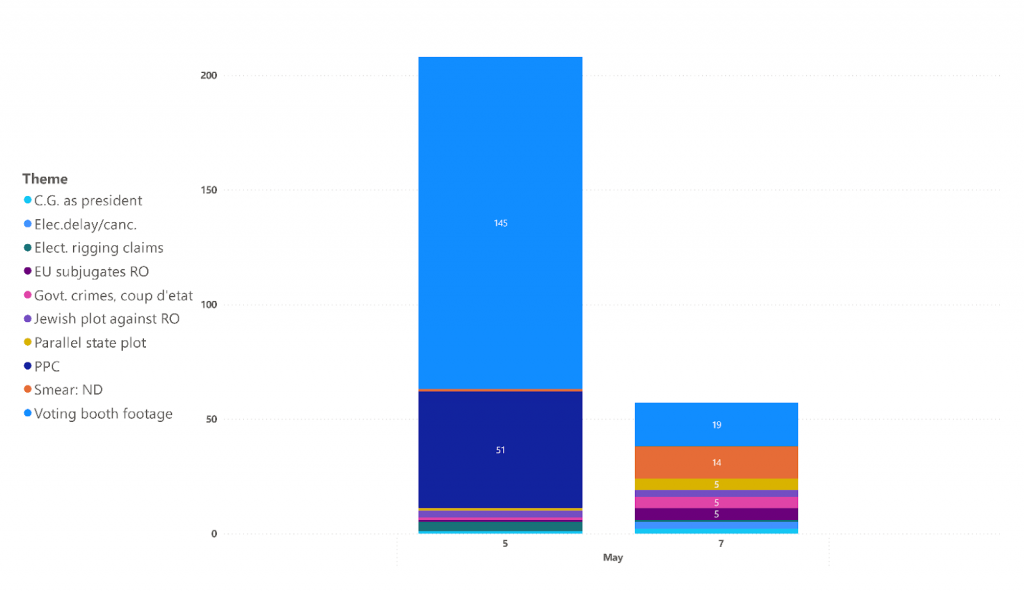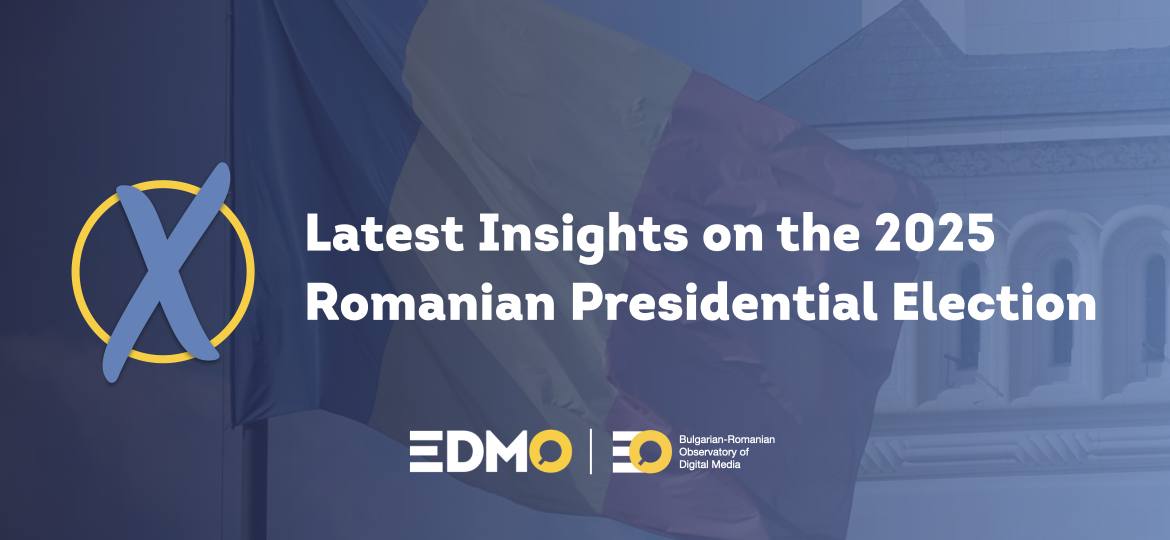Romania’s elections overview – 7 May 2025
This Bulletin is produced and published by Funky Citizens, Member of the Bulgarian-Romanian Observatory of Digital Media (BROD) and the EDMO Fact-Checking Network.
EXECUTIVE SUMMARY
George Simion has won the first round of presidential elections with 40.96%, followed by pro-European Nicușor Dan (20.99%) who narrowly qualified for the runoff ahead of governing coalition candidate Crin Antonescu (20.07%). Social media analysis has revealed widespread disinformation campaigns attempting to shape public perception as Romania enters a period of political and economic instability. Prime Minister Ciolacu resigned with PSD withdrawing from government, the Romanian currency hit a historic low of 5.1 lei to the euro, and Cătălin Predoiu was appointed interim Prime Minister. While a recent poll shows Simion leading with 54.8% versus Dan’s 45.2% for the May 18th runoff, both PNL and USR have now officially backed Dan. Disinformation has intensified online, featuring illegal voting booth footage, election rigging claims, and AI-generated smear campaigns particularly targeting Dan. The OSCE monitoring report highlights inadequate responses to inauthentic online behavior from both authorities and platforms, while civic engagement rises through planned pro-European demonstrations
WEEKLY OVERVIEW
The Central Electoral Bureau officially confirmed on May 6th the vote count that advances George Simion and Nicușor Dan to the second round. A total of 9,571,899 people from Romania and abroad voted in the May 4th elections, representing a turnout of 53.19% of all registered voters. Of these votes, 9,430,274 were validly cast (98.52%). The next procedural step is the CCR’s decision, as this institution validates the results of the first round of voting.
The first face-to-face debate between the two finalists will take place on Thursday, May 8th, at 8:00 PM, hosted by Euronews Romania at the Polytechnic University of Bucharest’s Rectorate, just hours before the official start of the second-round campaign.
Following the first round of the presidential elections on May 4th, Romania has entered a period of intense political and economic instability. On Wednesday, the National Bank of Romania announced a record exchange rate of 5.1 lei for one euro, after surpassing the threshold of 5 lei for the first time the previous day. This currency depreciation triggered strong emotional reactions among the population, with many currency exchange offices running out of euros as people rushed to purchase foreign currency. In Bucharest, exchange offices were quoting rates between 5.22-5.29 lei per euro, while others admitted they no longer had euros available.
Political tensions escalated when Prime Minister Marcel Ciolacu submitted his resignation on Monday, and the Social Democratic Party (PSD) announced its withdrawal from government. Interim President Ilie Bolojan appointed Cătălin Predoiu as interim Prime Minister on Tuesday. Predoiu, the current interim president of the National Liberal Party (PNL) and former minister in multiple governments, is serving as interim Prime Minister for the third time.
The Constitutional Court registered on Tuesday a request to annul the election submitted by Sebastian Constantin Popescu, the candidate of the New Romania Party, who obtained 0.28% of the votes. He alleges serious violations of democratic principles, voter manipulation through TikTok campaigns similar to those used for Călin Georgescu in 2024, and selective promotion of candidates in the media. The Constitutional Court has not yet set a date for hearing the electoral complaint.
Both major parties have now officially announced their support for Nicușor Dan. The PNL leadership unanimously decided on Monday to support him without conditions in the second round, as announced by interim president Cătălin Predoiu. Elena Lasconi announced her resignation as president of USR on Monday after obtaining less than 3% of the votes in the presidential election. USR’s Political Committee also officially announced their support for Dan on Monday evening, with interim president Dominic Fritz stating that “USR is united behind Nicușor Dan” and that it’s “time to unite forces to stop isolationists and restore normality to state institutions.”
In his first interview after the first round, George Simion made several notable statements on Digi24. George Simion outlined a plan to restructure Romania’s public administration by cutting 500,000 government employees over five years. He emphasized that this “radical” measure is necessary to avoid “bankruptcy” and that Romania should return to the 800,000 state employees it had in the early 2000s, now with the added benefits of digitalization.
Regarding relations with Ukraine and Moldova, Simion expressed confidence that both countries would normalize relations with Romania if he becomes president, stating it is “in their interest” to do so. He announced his intention to make his first presidential visit to Chișinău, despite his current entry ban which he expects will be lifted. On the Russia-Ukraine conflict, Simion condemned Russia’s “war of aggression” and stated firmly that “no sane person in Romania can ask Ukraine to give up territory.” Simion admitted that his absence from first-round debates was a strategic decision and “form of protest” against the annulment of previous elections. He also acknowledged that his campaign promise of 35,000 euro homes was a marketing strategy, saying “if we didn’t have these forms of promotion, we wouldn’t be where we are today, at 42% of votes.”. Looking forward, Simion declared his intention to appoint Călin Georgescu as prime minister if elected, or possibly push for early parliamentary elections.
Adding to the political climate, POT party president Anamaria Gavrilă caused controversy when confronted by journalists. Instead of responding to questions, she told reporters, “You are a species on the verge of extinction” and “I can’t wait to see you gone,” before walking away.
Meanwhile, civic engagement is rising with announcing a pro-European march in Bucharest on Friday, May 9th (Europe Day), from University Square to Victory Square. Organizers describe the march as a statement against those who would take Romania off “the straight path of European values” and onto “a dark path where freedom becomes a memory.”
An INSCOP poll conducted on election day shows that George Simion, who obtained 40.94% of the votes, was preferred by voters with primary education and those aged 30-44, while Nicușor Dan, who placed second with 23.23%, attracted significantly more votes from voters with higher education and young people between 18-29 years. INSCOP Research Director Remus Ștefureac noted that if voter turnout remains the same as in the first round, “the outcome of the final is clear,” but if it increases by 1.5-2 million votes, “then the final is still in play.”
The Organization for Security and Cooperation in Europe (OSCE), through its Office for Democratic Institutions and Human Rights (ODIHR), published a preliminary report on election monitoring, signaling that inauthentic behavior in the online environment posed a challenge that neither authorities nor platforms adequately addressed.
A court in Chișinău will examine on May 19th, one day after Romania’s second round of presidential elections, George Simion’s request to cancel his entry ban to Moldova. Simion has received multiple entry bans since 2009, with the most recent five-year ban imposed in 2018. If elected president, he has stated his intention to make his first official visit to Chișinău.
On Wednesday, Nicușor Dan presented a Verifield opinion poll showing George Simion leading with 54.8% of voting intentions for the presidential runoff, compared to 45.2% for the current Bucharest mayor. The survey, conducted on a sample of 944 people with a 3.19% margin of error, revealed that among the total voting population, Simion has 38.9% support versus Dan’s 31.3%, with 14.7% undecided and 13.8% either planning to cancel their votes, not vote, or not responding. The poll also indicated that former candidates’ voters are splitting their support, with 57.2% of Crin Antonescu’s voters backing Dan versus 18.8% for Simion, while Victor Ponta’s supporters favor Dan by 38.6% compared to 21.6% for Simion.
SOCIAL MEDIA DISINFORMATION
Regarding the social media content reported within this period, the conspiratorial and manipulative content themes present in previous reporting periods were also prevalent now, with an accent on a smear campaign targeting Nicusor Dan and election rigging claims. “Elec.delay/canc.” Was also a theme alleging that the electoral process will either be cancelled or intentionally delayed if the “wrong” candidate wins, relying on a similar theme for audience priming – that of a parallel state acting against its citizens or a conspiracy against Romania.
“Voting booth footage”, consists of mainly posts displaying voter preferences from within the voting booth, violating electoral law, were the most prevalent type of content reported. Codes like (Călin Georgescu) “C.G. as president” and (George Simion) “G.S. as president”, portraying these politicians as being already in office, while “Call to act. agst. const. order” and “Govt. crimes, coup d’etat” escalate the rhetoric by either promoting direct action against perceived crimes of the Romanian government against its own citizens or priming audiences for these type of messages.
A considerable amount of posts carried over from the previous reporting timeframe featured Premature Polling Claims (PPC), presenting unofficial figures portraying some candidates as being voted by the electorate.

Several codes reflect broader geopolitical or ideological conspiracies. “EU subjugates RO” accuses external actors, like the European Union, of infringing on Romania’s sovereignty. “Jewish plot against RO” illustrates antisemitic conspiracy theories attempting to scapegoat Jewish communities. Other narratives like “Parallel state plot” and “Smear: ND” aim to discredit political figures or parties with vague accusations.
Claims of Electoral Interference (EIC) of the Romanian state were made, using themes documented in previous periods. “EIC: Blackout” and “EIC: Stamp” warn about supposed planned disruptions, manipulations of the election infrastructure and plots involving voting stamps and procedures.
The novelty brought on by this reporting period is the notable increase in narratives attempting to smear Nicușor Dan through A.I. generated content, as well as discourse, memes and videos from a broad range of themes, from antisemitic rants to deepfakes involving the current Minister of Interior.
The thematic analysis of these posts, as well as the distribution across the themes identified in the current and previous reports suggest that most of the narratives present well before the electoral process are aimed at priming the audience before this crucial event, making future research into CIB networks of dissemination highly advisable.

FACT-CHECKING CORNER
Recent fact checks by Factual.ro have debunked several false claims circulating in Romania’s political sphere. AUR leader and presidential candidate George Simion made two demonstrably false statements: that Romanian is the second most spoken language in London after English, and that Romanian children born abroad lose their citizenship—both claims contradicted by official data. Similarly, AUR deputy Daniel Ghiță’s assertion that antisemitism never existed in Romania was rated false given the country’s well-documented history of antisemitic policies.
Other fact-checked falsehoods in Social Media included misinformation about ballot validity when ink bleeds through, unfounded fears about candies containing harmful pills, conspiracy theories about the WHO pandemic treaty forcing Romania to surrender sovereignty, and anti-vaccine disinformation. One claim about Romania’s democracy ranking below Papua New Guinea was rated partially false, as it misinterpreted global democracy indexes. There were also unverified allegations about a secret U.S. blacklist of Romanian leaders. These false narratives primarily target public health, electoral integrity, and international governance.
This newsletter is part of our ongoing work with the Bulgarian-Romanian Observatory of Digital Media, member of EDMO.
Author: Funky Citizens
